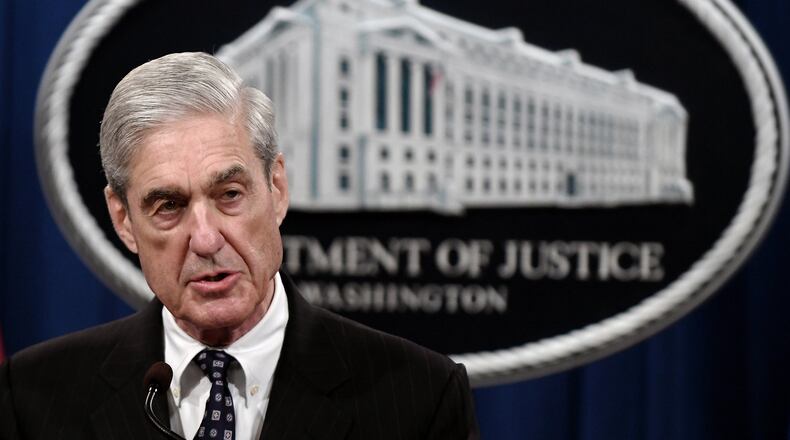Three Georgia lawmakers will question former special counsel Robert Mueller during a hearing Wednesday that could be a defining moment for Donald Trump’s presidency.
U.S. Reps. Hank Johnson of Lithonia and Lucy McBath of Marietta are Democratic members of the House Judiciary Committee, many of whom are expected to home in on potentially obstructive incidents by the president laid out in the text of Mueller's report.
U.S. Rep. Doug Collins of Gainesville, the panel’s senior Republican, is likely to focus his questioning on the origins of Mueller’s probe and the intentions of some of the senior investigators.
“What we’re going to find out is the dark underbelly of the corrupt cabal that started it all,” he said during a recent appearance on Fox News.
Collins tenaciously defended the president as Mueller conducted and completed his investigation and has accused the Judiciary Committee's Democrats of endlessly investigating Trump in order to harm his chances of re-election.
Staffers for Johnson and McBath would not share specifics about their bosses' questioning ahead of Wednesday's hearing, but neither Democrat has joined the more than 90 House members who have publicly backed opening an impeachment inquiry.
» Mueller testimony live updates: What time, what channel, livestream
“I think it’s not now time for impeachment,” Johnson said last month. “The American people don’t support it, and until they do, I think we should refrain from embarking upon an impeachment inquiry.”
Both voted with Democratic leaders last week to kill a symbolic impeachment effort on the House floor, as did U.S. Reps. John Lewis of Atlanta and Sanford Bishop of Albany. The only Georgia Democrat who supported the resolution was U.S. Rep. David Scott of Atlanta, who has refused to publicly elaborate on his thinking.
Local Democratic candidates for Congress have been more accepting of an impeachment inquiry, which must originate with the House Judiciary Committee. Some believe Wednesday’s hearing will up the pressure on Democratic leaders to open such proceedings, regardless of what Mueller says.
Interviews with more than a dozen Georgia Democrats showed a stark divide over the idea. Some, including Phyllis Hatcher, want party leaders to take a more aggressive and confrontational approach to Trump.
“We need to do impeachment proceedings. Why does the president get exempted? He needs to be accountable to the same laws that we are,” said Hatcher, a Rockdale County activist and former state Senate contender. “And the Democratic Party should hold him to account.”
Others worried the tactic could backfire.
“Impeachment is playing into Trump’s hand. He wants to be the aggrieved. He wants to look like they’re all after him — like he’s been wronged,” John Penn, an educator, said at a recent Conyers town hall meeting.
“I don’t think his base is growing,” Penn said, “but you can use that to scare a whole lot of conservative Democrats in battleground states.”
The divide has also split Georgia's two announced Democratic candidates for the U.S. Senate. Ex-Columbus Mayor Teresa Tomlinson has been outspoken in her support for impeachment proceedings, appearing with presidential candidate Tom Steyer at his "Need to Impeach" event in April 2018.
Citing the Constitution and “The Federalist Papers,” Tomlinson said Congress has “a duty” to commence with impeachment.
“Impeachment is not a tool to redo a prior election or to affect the next election,” she said. “It is to prevent one more day in which an executive can misuse the office and the power that goes along with it.”
Her rival, Clarkston Mayor Ted Terry, said the party’s focus should be trained on the ballot box.
“The American people have all the evidence they need,” he said. “What we’ve seen from the president and Senator (David) Perdue is enough to defeat them in 2020. I’m more interested in defeating them in the election than trying to impeach.”
McBath, a first-term Democrat in one of Georgia’s most competitive congressional districts, has tread carefully on the issue. A recent poll conducted by the House GOP’s campaign arm points to why.
The survey of 400 voters by the National Republican Congressional Committee — which has committed significant firepower to defeating McBath — found that 60% of voters in her district, which covers parts of Cobb, DeKalb and Fulton counties, oppose impeaching Trump. That includes 56% of independent voters.
But Democrats need no poll to remind them of the swingy politics of the 6th District, which had been held by Republicans for decades before McBath’s victory last year.
"We need to hear from the witnesses who can give us the truth as to what actually happened. We need to make sure that no entity, and no one person, is above the law," McBath said last month at a town hall in Dunwoody. "At the end of the day, the chips will fall where they may."
One lawmaker who has been surprisingly silent throughout the impeachment debate has been Lewis, an outspoken Trump critic who has boycotted all the president’s speeches to Congress after saying he didn’t see him as a “legitimate” president.
Lewis is a close ally of Speaker Nancy Pelosi, who has tamped down on impeachment talk and urged Democrats to win over public opinion first. He has said he supports her position.
“I could be persuaded in attending the meetings and being informed but have not arrived at a decision,” he said in June. “But something must give.”
AJC.COM LOGO
Go to ajc.com to keep up with Robert Mueller’s testimony before Congress throughout the day.







